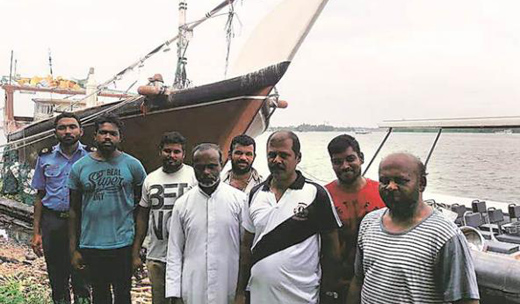
Nine Indians back in Kerala on stolen boat after 10 months as ‘slaves’ in Yemen
mangaloretoday.com/ yahoo
Kochi, Nov 30: On November 19, when they finally decided to flee Yemen coast to put an end to their 10-month ordeal, all that the nine fishermen from Kanyakumari region had was an 80-foot-long deep-sea fishing boat stolen from their employers, about 7,000 litres of diesel, limited supplies, and a GPS machine set with a latitude and longitude coordinating to Kochi. With that, they sailed for 10 days.

On Friday, the nine, natives of Colachel near Kanyakumari, reached Kochi harbour with the help of a Coast Guard vessel. After hours-long briefing before security agencies, they were let off on Saturday evening, a closure for all that they faced since January, when they landed, unwittingly, at Al-Shihr, a fishing harbour in southern Yemen’s Hadhramaut.
Sahaya Jagan, 33, one the fishermen, said five of them had initially gone to Sharjah port in the UAE in December 2018 with a job of maintaining boats, primarily ensuring performance of the engine and GPS. After working there for 45 days, they were asked to go to Oman with an Arab guide for further work. It did not bother them, Jagan said, since Oman is a peaceful coast.
“But we were actually being taken to Yemen’s Al-Shihr port, in the southwest of Oman. Soon after reaching there, the Arab guide left and a new agent took charge. They collected our passports and sent us for many fishing expeditions, each lasting 15 days,” he said.
Four more fishermen from Thiruvananthapuram coast, near Kanyakumari, joined them by March.
After two months, and spending over 45 days in sea, Jagan said they were paid only 1950 Dubai Dirhams (about Rs 38,000). “We questioned this, but they were not willing to talk. They stopped supply and refused to release our passports. As they denied us stay, we had to stay on the boat.”
They alerted Yemen coast guard officials, only to be told that “our supply will be restored if we continue work. We had no other option and went fishing again,” Jagan said.
“They gave us our passports only when we went for fishing — we finally decided to escape,” he said.
On November 19 they left Shihr “as usual for fishing”, and headed to India with a GPS coordinate for Kochi coast, about 1600 nautical miles (nearly 3,000 km) away.
When they were about 150 nautical miles (nm) from Kerala coast, they realised they were running short of diesel. “We managed to call a relative in Kanyakumari before the battery of the only phone died. We pleaded with them to alert Indian authorities to rescue us,” Jagan said.
Finally, early Friday, when they were about 68 nm from Kochi harbour, a Coast Guard patrol ship traced them and towed their fishing boat to Kochi harbour.
Father Churchill, general secretary of South Asian Fishermen Fraternity, who was in Kochi on Saturday to help them complete formalities with the government agencies, said many such fishermen are stranded in Gulf countries, living a slave’s life. “The Centre and state governments should have a mechanism to address such cases,” he said.